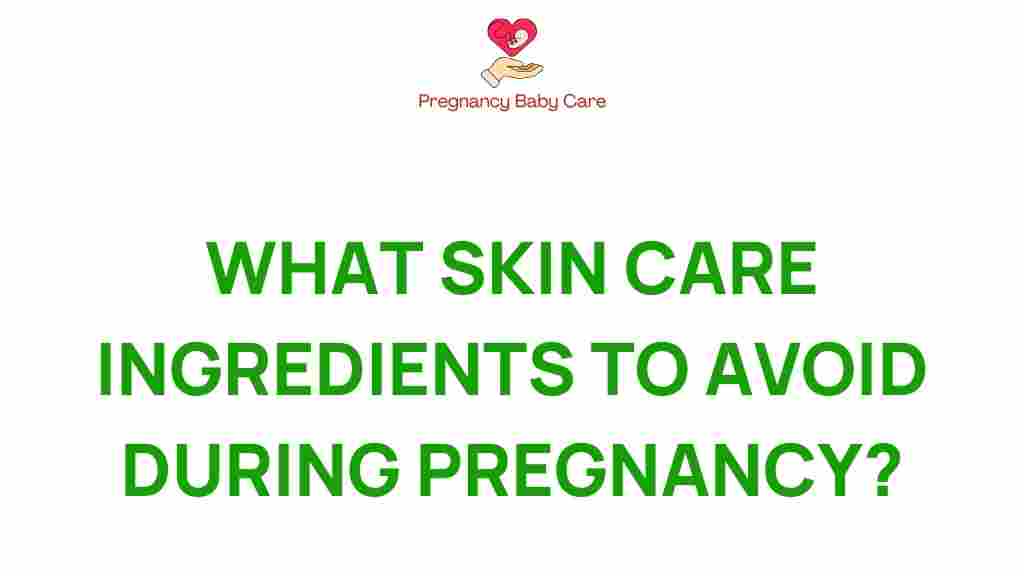Unveiling the Hidden Dangers: Skin Care Ingredients to Avoid During Pregnancy
Pregnancy is a beautiful journey filled with excitement and anticipation. However, it also comes with its own set of challenges, especially for expectant mothers who want to maintain their health and safety while looking after their beauty routine. One of the most critical aspects of this journey is the skin care routine. Many women may not realize that certain skin care ingredients can be harmful during pregnancy, potentially affecting both the mother and the developing baby. This article uncovers the skin care ingredients to avoid during pregnancy, ensuring that you can safely enjoy your beauty regimen.
The Importance of Skin Care During Pregnancy
During pregnancy, a woman’s body goes through numerous changes. Hormonal fluctuations can lead to various skin concerns, including acne, pigmentation, and dryness. Therefore, maintaining a proper skin care routine is essential for expectant mothers. However, it is equally important to be aware of the ingredients in your skin care products. Some ingredients may pose risks, making it critical to choose products wisely.
Ingredients to Avoid During Pregnancy
Here’s a detailed list of skin care ingredients that should be avoided during pregnancy:
- Retinoids (Vitamin A Derivatives): Commonly found in anti-aging products, retinoids can lead to birth defects and should be completely avoided.
- Salicylic Acid: This ingredient, often used for acne treatment, can penetrate the skin and potentially affect the baby. Opt for products with lower concentrations and consult with your healthcare provider.
- Hydroquinone: Typically used for skin lightening, hydroquinone is absorbed into the bloodstream and may pose risks to the fetus.
- Formaldehyde: A common preservative in many cosmetics, formaldehyde has been linked to various health issues and should be avoided.
- Phthalates: Often used to make fragrances last longer, phthalates can disrupt hormone levels and should be avoided during pregnancy.
- Essential Oils: While some essential oils can be safe, others may not be suitable during pregnancy. Always check which oils are safe to use.
- Aluminum Compounds: Often found in antiperspirants, these compounds can be absorbed through the skin and may have potential health risks.
- Mercury: Found in some skin lightening products, mercury exposure during pregnancy can lead to serious health issues for the baby.
- Tetracycline: This antibiotic can cause discoloration of the teeth in developing fetuses and should be avoided.
Understanding the Risks
Understanding why these ingredients pose risks is essential for expectant mothers. Many of the aforementioned ingredients can be absorbed through the skin and enter the bloodstream, potentially affecting fetal development. The first trimester is particularly crucial as the baby’s organs are forming, making it vital to avoid harmful substances during this period.
How to Safely Update Your Skin Care Routine
Updating your skin care routine during pregnancy doesn’t have to be daunting. Follow these steps to ensure your routine remains safe and effective:
- Consult with Your Healthcare Provider: Discuss your current skin care products with your doctor or dermatologist to understand which ones are safe to use during pregnancy.
- Read Labels Carefully: Always check ingredient lists for harmful components. Look for products labeled “pregnancy-safe.”
- Choose Natural Alternatives: Consider natural and organic skin care products that are free from harmful chemicals. Ingredients like aloe vera, coconut oil, and shea butter are typically safe.
- Be Cautious with Makeup: Many makeup products contain harmful ingredients as well. Opt for mineral makeup that is free from parabens and synthetic dyes.
- Stay Hydrated: Drink plenty of water to keep your skin hydrated from within, which can also help with pregnancy-related skin issues.
Additional Tips for Expectant Mothers
Here are some troubleshooting tips to help you manage your skin care routine during pregnancy:
- Patch Test New Products: Before introducing a new product into your routine, perform a patch test to ensure there are no adverse reactions.
- Monitor Skin Changes: Keep a close eye on any changes to your skin. If you experience severe reactions or rashes, consult your healthcare provider.
- Use Sunscreen: Protect your skin from sun damage with a pregnancy-safe sunscreen. Look for mineral-based sunscreens that contain zinc oxide or titanium dioxide.
- Limit Stress: High-stress levels can affect your skin. Incorporate relaxation techniques like yoga or meditation into your routine.
Safe Ingredients to Embrace
While many ingredients should be avoided, there are also numerous safe alternatives that can enhance your beauty routine:
- Glycolic Acid: In low concentrations, it can be beneficial for exfoliation without the risks associated with retinoids.
- Vitamin C: A powerful antioxidant that can help brighten the skin and reduce pigmentation.
- Hyaluronic Acid: Excellent for hydrating the skin and maintaining moisture levels.
- Chamomile: Known for its calming properties, chamomile can soothe irritated skin.
- Shea Butter: A natural moisturizer that can help with dryness and stretch marks.
Final Thoughts on Pregnancy and Skin Care
As an expectant mother, your health and safety are of utmost importance. By being informed about the skin care ingredients to avoid during pregnancy, you can protect both yourself and your baby while still enjoying a fulfilling beauty routine. Always prioritize products that are free from harmful chemicals and consult with your healthcare provider for personalized recommendations. Remember, your skin is an important part of your overall well-being, and with the right approach, you can navigate this beautiful journey with confidence.
For more tips on safe beauty practices, check out this informative resource. If you’re looking for safe products, consider visiting this trusted skincare site for recommendations.
This article is in the category Pregnancy and created by PregnancyBabyCare Team
